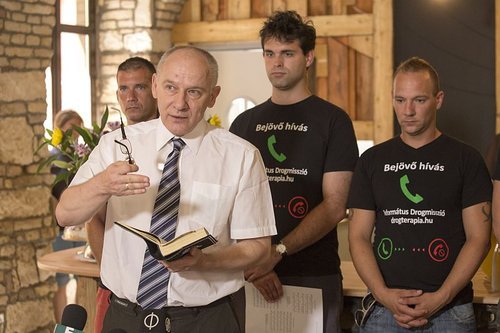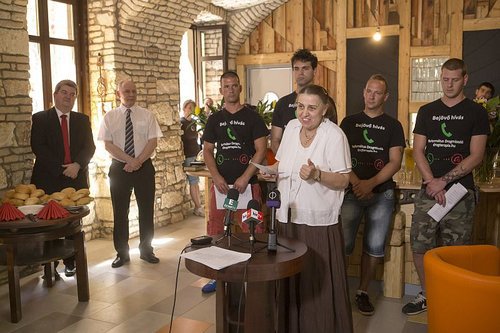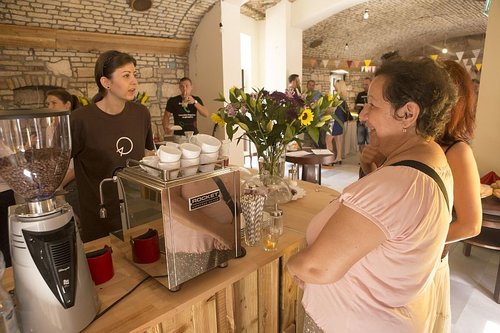“We are walking in unknown territory with this new service – this is exciting and fills us with hope, that there is a place in the capital city, where not reflecting current society’s pressure of consumption, but where the only requirement is talking, being together, lifestyle coaching, and changes,” said Bishop István Bogárdi Szabó, the Ministerial President of the Synod, at the opening of the Adna (Would Give) Café on the 12th of June in Budapest’s city centre. They want to bring sobriety into fashion in the newest institution, of the Reformed Thrown Youth Rescue Mission (KIMM)
In connection with this, at the end of the Ethiopian’s story István Bogárdi Szabó had highlighted two things in his devotional reflection. He named the meeting of Philip and the Ethiopian valet as a story of the audacious. He said that many ways of life that seem irreparable , that actually become irreparable , begin with audaciousness. However, God’s Holy Spirit can make us get into righteous audaciousness, like Philip, who was a deacon without rank, He came upon an influential politician and engaged this politician with the exposition of God’s Word. The Bishop spoke about his experience with the drug rehabilitation mission, of which he said “there is a necessity for this righteous audaciousness, for people sent by God, to enter our lives uninvited when we arrive at a dead-end road.

“The whole story of the mother Church is one kind of righteous audaciousness: Christian people, by God’s impulse, enter the lives of others; that’s why the Reformed Church in Hungary goes out to the life of Budapest’s city centre: to enter without being asked, where everybody lives their lives with no expectation that anyone will interact with them in their lives,” said the Ministerial President of the Synod. He added, “God doesn’t only enter into our lives, but he calls us to turn around in a dead-end road. And God opens new paths before us.” In line with the story the bishop reminded the audience that, “in 2015, it is not a problem if we remember this when we hear that Ethiopian Christians are killed in several parts of the world. Their story began somewhere, here with this meeting. The valet and Philip met and travelled together for some time, then they separated ways, but there were already two people on one way – this is a big secret. I think that Adna will be a place for many meetings, talking and entering in” the bishop said as he ended his sermon.
Drugs are a symptom that life is not going too well; that youth are stuck somewhere. We can do something for them not only in the social and health systems, but in their everyday lives too, because we can and we must – said Eszter Victorné Erdős, the leader of the Reformed Thrown Youth Rescue Mission (KIMM). Adna will provide a universal referred and referenced prevention: they offer community for lonelier youth, they give technical help for people who have drug problems, and they create a safe environment for abstaining addicts, too. Eszter Erdős said “With the help of youthful social places, we want to bring the pleasure of sobriety into fashion and guarantee tasty, healthy foods, drinks, personal discussions, communal events, sober parties and self-help programs. One important element of the prevention is that the programs of the café will be organized together with its visitors.

Beside this, Adna wants to be, first of all, a place where people can experience the grace of God – added the leader of the mission. She thanked the Budapest-North Presbytery and the Danubian Reformed Church District, for providing a place for the café, and for the planners, contractors and volunteers—all those people who helped bring Adna into being by their work and energy up to the last moment. The name Adna means: ‘pleasure in God’; we want to live this everyday.
“It’s hard to speak without emotion,” said Károly Czibere , Minister of State for Social Affairs and Inclusion. Mr. Czibere is the former Director of the Hungarian Reformed Church Aid, which oversaw Adna’s planning process. He said the café is a symbol that there is a future, there is a hope for healing. “The Hungarian community is in need of this message,” highlighted the minister. According to Mr. Czibere, it is not only the addicts who need this. It’s important for everybody, to have a place where a person can share a life story as they have coffee, where the visitor can come face to face with another person’s transformation. In connection with the film “Drognapló” (“Drug Diary,” a Hungarian film) he said: the quitting drugs doesn’t mean life without drugs, but a new life, rebirth and it is nice to meet people who have this reality in their life – who have already known that sugar-coating the end of a dead-end road is not enough because it is important to turn around, however hopeless it seems. tThe mission believes and preaches, that it possible.

Writer Viktor Kubiszyn’ testimony offered such an experience. He has enjoyed a new life for five years after sixteen years with drugs, and has since published novels and testimonies that liberation is possible through Jesus Christ. As he said, his story isn’t specific, but instructive. “It is bewildering standing here now, since I visited the neighbouring street for years because of heroin,”penned the writer, who got into the Drug Rehabilitation Centre in Ráckeresztúr for therapy in 2009 when he was 29 years old. He met God there and his life changed. – There I felt such safety, as I had never experienced anywhere – said Viktor Kubiszyn.
At the opening event of the café, past and present clients of Drug Rehabilitation Centre in Ráckeresztúr sang and prepared a reception, while at night Andelic Jonathan Jota and the band Keresztkérdés performed a concert for the celebrants. The café is still in construction, it gets nicer and nicer, and it is warmly awaiting its guests at Török Pál street 6.
Zsuzsanna Bagdán
Translated by Daniella Szűcs and Njeri Wagana Hughes